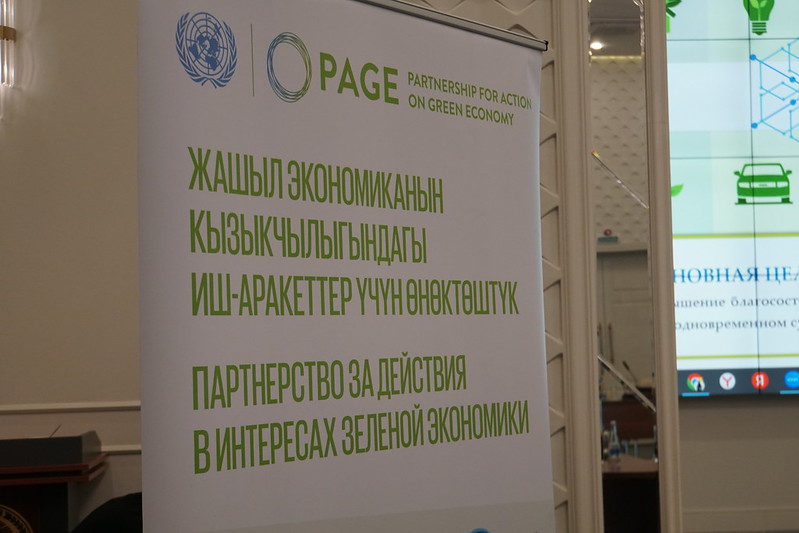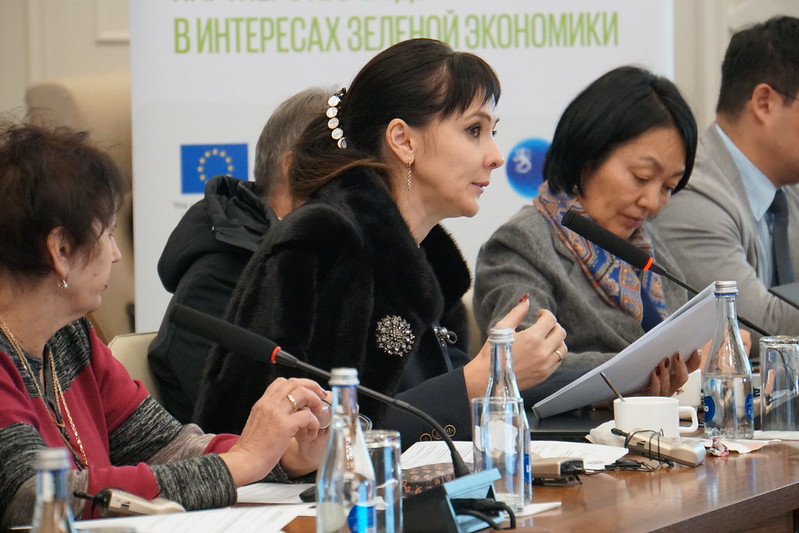PAGE accelerates policy reforms to promote green economy in Kyrgyzstan
December 12, 2023

12 December 2023, Bishkek – Today, the Partnership Actions for a Green Economy (PAGE) Kyrgyzstan and its national partners convened a Project Board meeting to commemorate seven years of collaboration, highlighting substantial progress towards fostering an inclusive green economy. Chaired by Deputy Minister of Economy, Sanjar Bolotov, the meeting brought together national stakeholders and development partners to discuss joint commitments and outline plans for 2024. This Project Board meeting aligns with the ongoing support for the implementation of the National Green Economy Strategy and associated actions in Kyrgyzstan.
In his opening remarks, Sanjar Bolotov underscored that the "PAGE initiative stands as a cornerstone partnership project, dedicated to creating favorable political conditions, incentives, business models, and partnerships. Its aim is to stimulate increased action and investment in green technologies, natural resources, human and social capital. PAGE achieves this by expediting policy processes, decisions, and investments that fortify socio-economic development, sustainability, and job creation."
The meeting witnessed the participation of key figures, including UNDP Deputy Resident Representative Monica Rijal, ILO Office Representative Liliya Kachkinbaeva, UNIDO Representative Abu Said, UNEP Representatives Madina Ibrasheva and Claire Portdevin, as well as a representative from the Association of Green Economy Universities, Nazira Esenalieva.

Monica Rijal, UNDP Deputy Resident Representative, highlighted, "PAGE agencies are collaboratively working with the Kyrgyz Government to practically implement key priorities of the Green Economy program. UN PAGE's thematic areas include Green Economy modeling, Sustainable Finance, Green Jobs, Green Industry, and Education for Sustainable Development, all established through strategic partnerships with key government entities."
As the leading PAGE agency in the Kyrgyz Republic, UNDP, alongside UNEP, UNIDO, ILO, and UNITAR, recognizes the green economy as a vital pathway to achieving the Sustainable Development Goals (SDGs). PAGE's work in Kyrgyzstan contributes to progress in sustainable agriculture, quality education, decent work and economic growth, industry, innovation and infrastructure, climate action, and partnerships to achieve goals. Consequently, UNDP has identified the development of an inclusive green economy as a priority area for sustainable economic growth in its Country Program until 2028.
The meeting comprehensively reviewed achievements, identified existing barriers, and addressed sustainability aspects. The discussion aimed to further integrate green economy principles into the policies and practices of sustainable development in Kyrgyzstan. Participants exchanged information and ideas on sustaining PAGE's results through the integrated ongoing and planned efforts of key stakeholders and development partners.
Presentations on project work covered various areas, including sustainable green finance and its roadmap, which is currently in its finalization stage. The meeting explored potential options for launching a green financing mechanism in Kyrgyzstan, with active involvement from the Ministry of Economy and Commerce (MEC KR) and the Union of Banks, fostering close cooperation with all interested partners. Additionally, outcomes from developing a model for creating green jobs and implementing training programs on the green economy at universities were showcased. UNEP presented its results and plans on sustainable public procurement.

Liliia Kachkinbaeva, Project Coordinator of ILO in Kyrgyzstan, shared, "The ILO is finalizing a brief detailing our implementation of PAGE activities in Kyrgyzstan. This includes developing a green jobs assessment model and focusing on economic development, the labor market, entrepreneurship, and environmental issues. Our aim is to ensure the creation of decent green jobs while advancing a green economy."
Gleb Pokatovich, UNDP expert on green finance, added, "Today, we are evaluating the requirements of various institutions for the implementation of National Green Financing Mechanisms in Kyrgyzstan. This includes assessing the volume of financing provided by international donors for green projects and exploring ways to support companies during the application process while enhancing transparency. Active efforts are underway to develop an action plan with the State Development Bank and other stakeholders."
Looking ahead, PAGE activities in Kyrgyzstan will continue in 2024 in collaboration with GIZ and OSCE on the implementation of selected activities. The upcoming initiatives include Green Economy modeling, a focal point for the newly established Institute for Sustainable Development under the Ministry of Economy and Commerce. Expert support will extend to the development of the Green Economy Development Program for 2024-2028, as well as mobilizing resources for selected areas of the green economy to ensure the sustained success of PAGE results
For Reference:
Partnership for Action for a Green Economy (PAGE) – places sustainability at the core of economic policy and practice to advance the 2030 Agenda. PAGE is an initiative in response to the results of the UN Conference on SD in Rio de Janeiro (RIO+20, 2012). This is a joint initiative of 5 UN agencies to implement the SDGs.
Currently, twenty-two countries are officially included in the list of partners and receive direct support from PAGE (Burkina Faso, China (Jiangsu Province), Ghana, Mauritius, Kazakhstan, Kyrgyzstan, Mongolia, Brazil, South Africa, Peru, Ghana, Senegal, etc. ), 32 countries have expressed interest in participating. 48 countries in the world are developing green economy strategies and programs.
In Kyrgyzstan, the Ministry of Economy is the coordinating body in promoting green development initiatives within the framework of this project. The Ministry of Finance, the Ministry of Agriculture, Food Industry and Land Reclamation, the Ministry of Education and Science, the State Agency for Environmental Protection and Forestry, and the National Statistical Committee are also partners in the PAGE initiative.

 Locations
Locations








